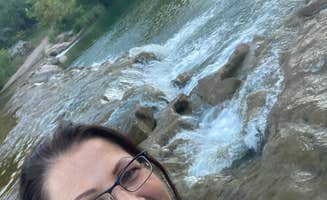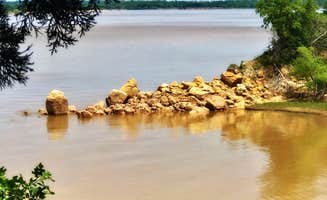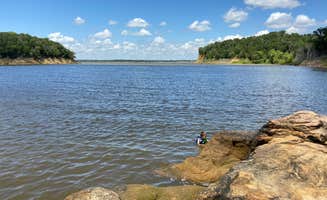Rustic camping near Ardmore, Oklahoma provides outdoor enthusiasts access to both Oklahoma and Texas wilderness areas within a roughly 40-mile radius. The region sits at the convergence of the Cross Timbers ecological zone and the Arbuckle Mountains, with elevations ranging from 700 to 1,400 feet. Summer temperatures typically reach 90-100°F with high humidity, while winter nights can drop below freezing.
What to do
Fishing opportunities: Blue River Camp offers trout fishing during designated seasons. One camper noted, "The fishing however is not good. We stayed for 3 days and fished the whole time with no luck," suggesting that fishing success can vary significantly at this Blue River Camp.
Hiking trails: The Cross Timbers Trail provides technical hiking terrain along Lake Texoma shorelines. "Cross Timber's Trail is technical for the region and is a 14 mile point to point trail along the shore of Lake Texoma," reports a camper who frequently visits the Eagle's Roost Campsite.
Swimming spots: Many dispersed camping areas feature natural swimming holes. A visitor mentioned, "There's a really neat little spot south of the dam with a rope swing," referring to a swimming area accessible from Blue River Camp.
Wildlife viewing: Bird watching opportunities abound, especially at lakeside peninsulas. "Birds flock over and it's far enough away from the freeway that it's quiet (with the exception of the occasional fishing boat)," says one camper about their Eagle's Roost experience.
What campers like
Natural water features: Campers consistently praise the water quality at some locations. "The water was amazing and clean. We went on a Tuesday so there wasn't any one else there. We did some awesome exploring up and down the river," reports a visitor to Blue River Camp.
Solitude on weekdays: Mid-week camping offers significantly more privacy at most sites. According to one camper at 5 Mile Camp Primitive Dispersed Camping, "Amazing backcountry feel on Lake Texoma shores. Come prepared it's fully primitive but there are spots all up and down the Cross Timbers Trail you can either boat or backpack too."
Flat camping terrain: Many sites provide level ground for tent setup. A Blue River camper mentioned, "There was so many campsites and they were all well maintained and flat," making tent setup more convenient.
Scenic variety: The region offers diverse landscapes within short distances. One camper described their Cross Timbers experience as having a "Remote feel close to home."
What you should know
License requirements: Conservation permits can be expensive at certain locations. One camper reported, "To enter the grounds you need a hunting/fishing license or a 3day wildlife conservation passport. The passport is for any activity on the grounds, excluding hunting or fishing and they are $51 currently."
Accessibility challenges: Some sites have unclear or restricted access points. A camper attempting to visit 5 Mile Camp noted, "The coordinates bring you to what looks like a driveway that has signs for no trespassing and beware of dogs. After looking at the map, it looks like that's the only way to get back there."
Weather preparedness: Rapid weather changes can impact camping conditions. One visitor recounted, "I stayed in my hammock and buddy in his tent back in Nov 2019. Stopped just before a cold front with rain hit and built a fire. Found a long sheet of tent to reflect the heat so had a great time hiking in."
Litter concerns: Visitors should be prepared to pack out trash. A Blue River Camp visitor observed, "The only downside was the amount of trash that people had left."
Tips for camping with families
Water safety monitoring: River crossings require caution with children. At Hughes Crossing in Blue River Camp, a visitor observed, "It's a waterfall that you can drive over. I did not attempt this in the mustang, but watched several trucks easily pass over."
Exploration opportunities: The area offers many shallow water play areas. "We did some awesome exploring up and down the river," noted one camper, making this an interactive environment for children.
Navigation planning: GPS coordinates may not be reliable in all areas. "When I arrived at the location to which my GPS directed me, I was a little concerned that there was just a building with bathrooms and three large dumpsters off to the side," reported one Blue River Camp visitor who initially struggled to find the actual campsites.
Tips from RVers
Road condition awareness: Gravel and dirt access roads can be challenging for larger rigs. A Blue River Camp visitor noted, "If I had been brave enough to drive my little Mustang down the gravel path that was on the opposite side of the road leading away from the restrooms, I would have found waterfront campsites."
Designated RV areas: Some locations separate RV sites from tent camping. A visitor observed, "There was a gravel road on the opposite side of the parking lot that led to the RV camping and a couple of tent sites along that road."
Site selection strategy: Primitive RV sites with water access exist but require advance planning. "The campsite was secluded with several paths that lead down to the river," mentioned one camper, highlighting the potential for finding private spots.




